|
Rotten Library > Conspiracy > Task Force 121
Task Force 121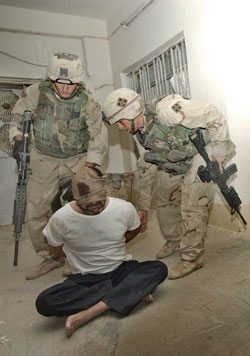 Are your Special Forces just not special enough? Have your covert ops all gone overt? Is your "black bag" squad recycling last year's leather purse?
Are your Special Forces just not special enough? Have your covert ops all gone overt? Is your "black bag" squad recycling last year's leather purse? There's nothing to reinvigorate an ailing global conspiracy like a freshly named and numbered task force with virtually unlimited power. (Just ask Majestic-12.) Task Force 121 may end up being the Bush Administration's major contribution to posterity. A division of the Army Special Forces, the force is made up of Delta Force commandos, Navy SEALs, Green Berets, a bunch of shady, well-armed guys from the CIA and miscellaneous action heroes from various countries. No one knows what Task Forces 1 through 120 are up to these days, but Task Force 121 was created out of Task Force 5 (an special forces unit working in Afghanistan) and Task Force 20 (an Iraq-based special forces unit). The mission of Task Force 121 is making the world safe for... well, let's call it democracy. The force is assigned to capture or kill "high-value targets" in the War on Terrorism and in the Iraq occupation.
It's estimated that TF121 has around 1,500 members, but the exact number is top secret, as are most of the operational details. TF121 is the brainchild of Secretary of Defense Donald Rumsfeld. After September 11, Rumsfeld jumped on the opportunity to elevate the status of the Pentagon by setting up an alternative Justice Department -- one with lots of prisons, but not so many pesky constitutional rights.
According to an Army Magazine, one of only a handful of official statements on the force:
...Task Force 121 and other units operating against Iraqi resistance have learned the lessons of past modern wars. They will not simply sweep towns. This won't defeat an organized insurgency. Instead, the enemy's organization must be targeted to defeat the clandestine organization attempting to impose its will on the Iraqi people... Just as the traditional war is not fought with the individual soldier or platoon in mind but rather the state's capacity and will to continue hostilities, modern war seeks to destroy the organization as a whole and not simply its violent arm or peripheral organs. Unfortunately, the actual operation of the group sometimes looks a little more like the Inquisition than an episode of Mission: Impossible. TF121 pulled a hairy-looking Saddam out of a hole in the ground. The Task Force's civilian head is the same strategic mind that brought you Lynndie England holding a dog leash, and the top general under him has described Muslims as the tools of Satan. The head of Task Force 121 is Rear Admiral Bill McRaven, a former Navy SEAL with a name straight out of an action movie. According to Newsweek, a colleague of McRaven's described him thusly: "He is physically tough, compassionate and can drive a knife through your ribs in a nanosecond."
Part of Rumsfeld's anti-terrorism policy, which later expanded to an anti-everything policy, was the practice of "snatch and grab" operations. In bureaucratese, a snatch is known as an "extraordinary rendition," which is a nice way to say "illegal kidnapping." In many terrorism cases, the problem is that even legit wanted terrorists are still usually found in countries where some manner of laws apply. In most cases, it's illegal for U.S. troops to simply storm into a country and remove a person by force -- even when that person is Osama bin Laden. Through the 1990s, snatches were rarely done, due to such pesky legalities as the rule of law, international human rights and the U.S. Constitution, which appeared to be philosophically opposed to such behavior (while not specifically banning it, for the most part).
There was no compelling threat that the average American would see as a justification for strong-arm tactics like dropping an extraordinary rendition team into a sovereign nation's capital on a kidnapping or assassination mission. That isn't to say it wasn't done. Former terrorism czar Richard A. Clarke wrote in his memoir about an incident in which he briefed President Bill Clinton and Vice President Al Gore on a proposed rendition. Clinton pointed out that the White House counsel objected to the mission on the basis that it was illegal. "That's a no-brainer," Gore is said to have replied. "Of course it's a violation of international law. That's why it's a covert action." (The 1993 mission was approved, but was not successfully carried out. Clarke didn't say who the target was.)
Rumsfeld proposed reorganizing the military mission to strongly focus on what he called "manhunts." His argument boiled down to the notion that it was more efficient and effective to deploy the army against individuals than it was to deploy the army against other armies. This philosophy would rule the armed forces policy of the Bush administration for the remainder of its term, with only questionable success. Task Force 121 was a direct outgrowth of Rummy's ruminations. The force was developed in consultation with Israel. On the one hand, that seemed sensible since Israel had a lot of experience fighting guerilla wars against terrorism. On the other hand, Israel had been fighting those wars for decades without winning -- or even slightly improving its security. Whatever the case, a squad of Israeli intelligence and combat experts flew to Fort Bragg to train the Task Force's founding members. The Israeli influence can be seen in TF121's strategy, as explained by a general interviewed in the New Yorker:
"The only way we can win is to go unconventional. We're going to have to play their game. Guerrilla versus guerrilla. Terrorism versus terrorism. We've got to scare the Iraqis into submission."
The plan was for TF121 to create a core group of Iraqi intelligence operatives out of the remnants of Saddam's intelligence services. These operatives would infiltrate the Baathist networks and report back to the Force, which would then kick righteous ass and take names. What could possibly go wrong? Indeed, TF121 got off to a fairly strong start. The group caught the big fish in Iraq, Saddam Hussein, hiding at the bottom of a hole in the ground. The photo op was spectacular -- nattily uniformed U.S. forces dragging the bedraggled former dictator out of his spider hole. Task Force 121 was even in some of the pictures, but only their boots and guns (as befits its top secret status). Unfortunately, despite catching the big man himself, the Iraq insurgency has only picked up steam. It's hard to blame that on Task Force 121, since it presumably gets its policy objectives from the Pentagon. Nevertheless, it's increasingly clear that the Baathists are only one small element in a diverse panoply of Iraqis who hate the U.S. The insurgency problem has only deepened since Saddam's capture.
Although it hasn't been definitely established yet, rumors have been flying thick that Task Force 121 may have been involved in directing interrogations at Abu Ghraib and elsewhere. TF121 has the particular misfortune to have been sponsored by the Defense Department's top spook, Stephen Cambone. An Undersecretary of Defense for Intelligence, Cambone is more or less the top civilian exclusively responsible for military intelligence, including collection and covert operations. Cambone is an obvious choice to "take one for the team," and it looks like the Congressional overseers of the Defense Department are ready to take him as the first in a series of sacrificial lambs. According to the New Yorker, Cambone's main qualification to lead a military intelligence service was apparently his ability to covertly infiltrate his nose extravagantly far up Rumsfeld's ass. His top aide was a general named Bill Boykin, who previously distinguished himself with public statements that "Satan wants to destroy (the United States)," that the U.S. was a "Christian army," that President Bush was "appointed by God," and that Boykin's personal message to the Muslim world was: "My god is bigger than your god." Unfortunately, Cambone's talent for intelligence was responsible for such important tasks as justifying the claim that Iraq had weapons of mass destruction, or that it was allied with al Qaeda. There were significant problems with his work in these areas, such as the fact that the information he provided was not true.
Aside from its undisclosed role in capturing Saddam, TF121 has reportedly been executing missions in Afghanistan and Pakistan, where they have been hunting bin Laden and other top al Qaeda figures believed to be hiding in the border regions (such as Ayman Al-Zawahiri). Obviously, those efforts had not visibly succeeded as spring 2004 turned into summer, nearly three years since September 11 put the issue of terrorism on the radar. Meanwhile, the mandate for Task Force 121 just keeps on getting broader and broader. According to the New Yorker, the administration has been looking at expanding operations into Iran. Based on the same flimsy kind of intelligence that got the U.S. into Iraq in the first place, some in the Bush administration have now determined that Iran is the actual cause of all America's problems in Iraq. One of the benefits of using a group like Task Force 121 as a secret army, carrying out the country's dirty work all over the world, is that Special Forces mission are not included under the War Powers Act. The practical effect of that legal detail is that the president can launch Special Forces missions without having to notify Congress in advance, seek Congressional approval to continue or even disclose any details of the mission after its done, including the number of forces deployed, their appointed tasks, collateral damages along the way (like innocent civilians accidentally killed), any illegal or mistaken detentions... or whether Task Force members are stationed in specific locations, like Abu Ghraib, performing specific jobs, like beating confessions out of naked suspects wearing dog leashes. Operations in Abu Ghraib were completely obscured by the presence of civilian contractors freely intermixed with military intelligence operatives and CIA personnel in civilian clothing, even using aliases that shielded their identity from the regular military.
Task Force 121 has most recently been commissioned with finding Abu Musab al-Zarqawi, an al Qaeda-linked terrorist who is the latest figurehead for the Iraqi insurgency. The Defense Department is now deploying against Zarqawi based on the same assumptions that it made about Saddam, and cruising toward arguably the same conclusion, i.e., that they catch him, but it doesn't appreciably advance the goal of stopping the insurgency.
Like Osama bin Laden, whom TF121 (possibly now operating under a different name and number) has also been tasked to find, Zarqawi has a lot of experience living on the run, in primitive conditions, with a minimal support structure and an impossibly arcane system for laundering funds. It's a whole different ball game, but then this bunch hasn't been required to follow any particular rules. If anyone can switch from soccer to hockey in mid-field, it would be Task Force 121.
|
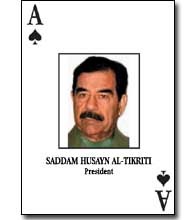 The original targets for Task Force 121 were members of the former Saddam regime. More or less, the U.S. created this top secret force of elite commandos operating near the fringes of legality to play a game of "52 pickup" with that infamous deck of playing cards featuring pictures of all major officials from the
The original targets for Task Force 121 were members of the former Saddam regime. More or less, the U.S. created this top secret force of elite commandos operating near the fringes of legality to play a game of "52 pickup" with that infamous deck of playing cards featuring pictures of all major officials from the  Military-run prisons like
Military-run prisons like 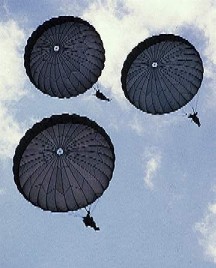 Most of the credible reporting on TF121 comes from just a very few sources -- mainly the New York Times, and the New Yorker's Seymour Hersh, who also helped break the story of prisoner
Most of the credible reporting on TF121 comes from just a very few sources -- mainly the New York Times, and the New Yorker's Seymour Hersh, who also helped break the story of prisoner 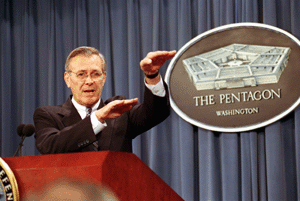 After the September 11 attacks, the
After the September 11 attacks, the 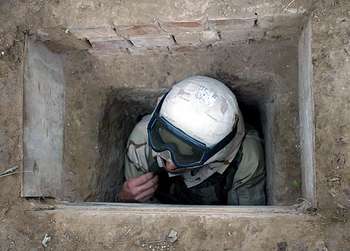 Task Force 121 was first deployed in Iraq with the mission of scouring the country for Baathists, former Saddam regime members who were suspected to be leading the insurgency there. (Not necessarily a correct deduction.)
Task Force 121 was first deployed in Iraq with the mission of scouring the country for Baathists, former Saddam regime members who were suspected to be leading the insurgency there. (Not necessarily a correct deduction.) 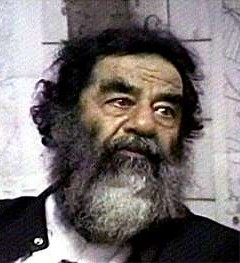 Things could get worse for Task Force 121 if it gets dragged out into the harsh light of day. The scandal around the prison abuse at Abu Ghraib has the U.S. Congress in a froth, insisting that the Defense Department cough up more and still more information about just what the hell it's been up to these last few years.
Things could get worse for Task Force 121 if it gets dragged out into the harsh light of day. The scandal around the prison abuse at Abu Ghraib has the U.S. Congress in a froth, insisting that the Defense Department cough up more and still more information about just what the hell it's been up to these last few years. 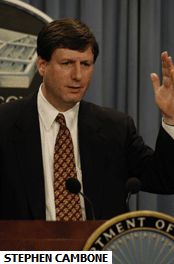 As the parents of Task Force 121, Cambone and Boykin aren't likely to provide the sort of stable home that a paramilitary hit squad needs in order to thrive.
As the parents of Task Force 121, Cambone and Boykin aren't likely to provide the sort of stable home that a paramilitary hit squad needs in order to thrive. 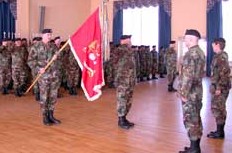 Despite all these unanswered questions and unknown liabilities, the work of the force continues unabated, even as its civilian heads wade deeper into the waters of political accountability. Rumsfeld's manhunts continue... for at least as long as Rumsfeld himself continues.
Despite all these unanswered questions and unknown liabilities, the work of the force continues unabated, even as its civilian heads wade deeper into the waters of political accountability. Rumsfeld's manhunts continue... for at least as long as Rumsfeld himself continues. 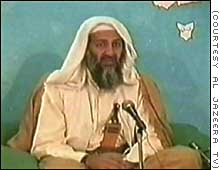 That's assuming they can even catch him. Saddam had been king of his own little world for decades. He lived in opulence, kept his money in banks, and was constantly surrounded by sycophants.
That's assuming they can even catch him. Saddam had been king of his own little world for decades. He lived in opulence, kept his money in banks, and was constantly surrounded by sycophants.